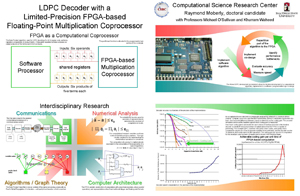 |
||||||||
| LDPC Decoder with a Limited-Precision FPGA-based Floating-Point Multiplication LDPC Decoder with a Limited-Precision FPGA-based Floating-Point Multiplication Coprocessor | ||
|
An Implementation of the sum-product algorithm
in an FPGA considers tradeoffs between computational precision and
computational speed. The probabilistic algorithm is used for iterative
soft-decision decoding of LDPC codes. Our FPGA-based coprocessor
(design) performs computer algebra with significantly less precision
than the standard (e.g. integer, floating-point) operations of general
purpose processors with comparable iterative convergence. Using
synthesis, targeting a 3,168 LUT Xilinx FPGA, we show that key components
of a decoder are feasible and that the full single-precision decoder
could be constructed using a larger part.
Soft-decision decoding by the iterative belief propagation algorithm is impacted | ||
|
both positively and negatively by a reduction
in the precision of the computation. Reducing precision reduces
the coding gain, but the limited-precision computation can operate
faster. A proposed solution offers custom logic to perform computations
with less precision, yet uses the floating-point format to interface
with the software. Simulation results show the achievable coding
gain. Synthesis results help theorize the the full capacity and
performance of an FPGA-based coprocessor.
|
||
| • Other Abstracts • | ||
